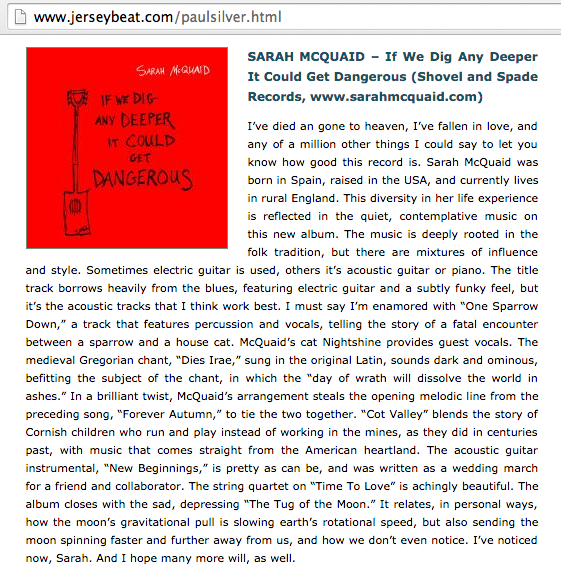12 March 2018
Album review – If We Dig Any Deeper It Could Get Dangerous. “I’ve died and gone to heaven, I’ve fallen in love, and any of a million other things I could say to let you know how good this record is.”
http://www.jerseybeat.com/paulsilver.html
SARAH MCQUAID – If We Dig Any Deeper It Could Get Dangerous (Shovel and Spade Records, www.sarahmcquaid.com)
I’ve died and gone to heaven, I’ve fallen in love, and any of a million other things I could say to let you know how good this record is. Sarah McQuaid was born in Spain, raised in the USA, and currently lives in rural England. This diversity in her life experience is reflected in the quiet, contemplative music on this new album. The music is deeply rooted in the folk tradition, but there are mixtures of influence and style. Sometimes electric guitar is used, others it’s acoustic guitar or piano. The title track borrows heavily from the blues, featuring electric guitar and a subtly funky feel, but it’s the acoustic tracks that I think work best. I must say I’m enamored with “One Sparrow Down,” a track that features percussion and vocals, telling the story of a fatal encounter between a sparrow and a house cat. McQuaid’s cat Nightshine provides guest vocals. The medieval Gregorian chant, “Dies Irae,” sung in the original Latin, sounds dark and ominous, befitting the subject of the chant, in which the “day of wrath will dissolve the world in ashes.” In a brilliant twist, McQuaid’s arrangement steals the opening melodic line from the preceding song, “Forever Autumn,” to tie the two together. “Cot Valley” blends the story of Cornish children who run and play instead of working in the mines, as they did in centuries past, with music that comes straight from the American heartland. The acoustic guitar instrumental, “New Beginnings,” is pretty as can be, and was written as a wedding march for a friend and collaborator. The string quartet on “Time To Love” is achingly beautiful. The album closes with the sad, depressing “The Tug of the Moon.” It relates, in personal ways, how the moon’s gravitational pull is slowing earth’s rotational speed, but also sending the moon spinning faster and further away from us, and how we don’t even notice. I’ve noticed now, Sarah. And I hope many more will, as well.

